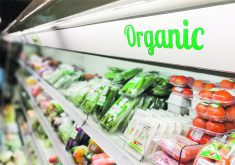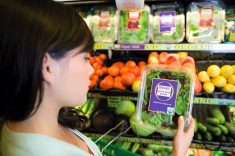The pandemic has broken, shaken and disrupted many things, but the galloping development of plant protein demand isn’t one of them.
“One thing that’s stayed consistent is consumers’ obsession with protein,” Jo-Ann McArthur, a food markets expert who operates Nourish Food Marketing, said at the Manitoba Protein Summit.
About 43 percent of Canadians say they’re trying to increase their consumption of plant-based proteins.
That’s good news for the burgeoning Manitoba protein industry, which has added a number of plant protein production facilities to its existing collection of animal protein processing capacities.
Read Also

Farming Smarter receives financial boost from Alberta government for potato research
Farming Smarter near Lethbridge got a boost to its research equipment, thanks to the Alberta government’s increase in funding for research associations.
However, the nature of that demand is anything but uniform, McArthur said. The evolution of “ethics-based” eating means that the people who are most keen on eating more plant proteins are also likely to bring demands for environmental, labour and agricultural issues into the grocery store with them.
“That’s why we’ve seen a huge increase in organics, in certified humane, in fair trade,” said McArthur, who has worked with Molson, Proctor and Gamble and Unilever.
“Organics during the pandemic has really had a really tough time filling the demand.”
Plant protein consumers are likely to care about the situation of both farm and food workers. They care about the conditions of animals in the meat system.
“We’re expecting this spotlight on social justice and migrant workers to continue,” said McArthur.
Consumers are also beginning to say they care about “soil health” and other contemporary agricultural sustainability ideas.
Farmers and food processors are going to have to get used to consumers wanting to know more about their production systems and processes.
“There’s always been this curtain between consumers and (food) producers, and I think the producers liked it that way, but during COVID that veil, that curtain, has really fallen,” said McArthur.
“We’re starting to see that consumers are really wanting to understand how their products are farmed and what conditions the animals were in.”
The pandemic has accelerated this trend to hyper-conscious shopping.
“People have been online a lot more, and there’s been a real examination in this period of societal inequities and inequalities, and agriculture found itself on the front page with this whole migrant worker issue,” said McArthur.
The competition between old protein mainstays like the three big meats and the new plant-based sources isn’t necessarily head-to-head. People who buy meat substitutes don’t always want to entirely abandon meat.
“We think there’s a different way of doing flexitarian… in terms of reducing your (carbon) impact. We dub it ‘lessitarian.’”
That means consumers are often happy to reduce but not remove animal-based sources of protein. That’s possible with the animal-plant blended protein products that are more frequently coming to market.
“It allows you to enjoy all the taste and still lessen your carbon impact,” said McArthur.
One of the summit organizers, James Battershill, has helped develop and is commercializing an animal-plant blended protein, called BUMP.
Maple Leaf Foods also has a blended protein product that is about half-and-half animal and plant.
There are cheese and dairy products that mix milk with almond and other plant proteins.
“It’s a way of combining the best of both worlds,” said McArthur.
The importance of labelling will continue to grow. There are now logos, badges and mottos for “humane,” “premium,” “sustainable” and a variety of specific production practices like grass-fed. Those labels draw consumer interest.
Packaging is also going to become more important because millennial and Gen-Z consumers are conscious of the waste and carbon footprint of excessive packaging that can’t easily be reused.
Sav Bellissimo, a brand management expert with Federated Co-operatives, said companies like his and consumers are getting wise to recyclable packaging that generally isn’t recycled and biodegradable products that aren’t biodegraded, and looking at the carbon impact of every element of their food.
Wasteful packaging won’t do well with these consumers.
“If you’re in plant-based, you’ll be held to a higher standard if you’re trying to wave that environmental flag,” said McArthur.
An interesting challenge is promoting some of the meat substitutes and other complex products as healthy alternatives.


















